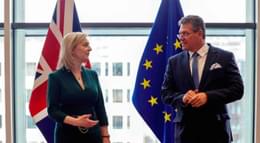
Don't fall for this isolationist myth
If it were true that "isolation costs jobs, costs growth, costs people's livelihood", New Zealand ought to be the poorest nation on the planet, and Australia shouldn't be far behind, says Professor Tim Congdon.
There are three million of our fellow citizens, men and women, in this country whose jobs rely directly on our participation and role and place in what is after all the world's largest borderless single market with 500 million consumers right on our doorstep," declared Nick Clegg, as Deputy Prime Minister, on the Today pro- gramme of October 31, 2011. More generally, in his view, ". . . isolation costs jobs, costs growth, costs people's livelihood."
Clegg was talking about the "isolation" that Britain would suffer, in his view, if we left the European Union. It was one of the most forthright statements of "the three million jobs lie" which was central to Project Fear and to the economic case for remaining in the EU. Since June 2016, the argument has van- ished from the public debate for a simple rea- son: it has been completely wrong. Job growth has continued despite the referen- dum result. The number of people in employ- ment in the UK in June 2016 was 31.8 million, while in October 2018—the last month for which data are available—it was 32.5 million.
The Clegg proposition was always silly. An implication was that a country was "iso- lated" if it did not belong to the EU, which would have come as a surprise to the 160 of the world's 190 or so nations—including Chi- na and the United States of America—which had (and have) this geopolitical status. Fur- ther, if it were true that "isolation costs jobs, costs growth, costs people's livelihood", New Zealand ought to be the poorest nation on the planet, and Australia shouldn't be far behind, whereas in fact New Zealand and Australia have higher living standards than the average EU member state.
In a famous 1946 essay, politicians were mocked by George Orwell for rhetoric which "make lies sound truthful and murder re- spectable" and give "an appearance of solid- ity to pure wind". In this respect they, of course, have much in common with public relations executives, whose number Clegg has now joined. Unfortunately, loose and sloppy language of the Clegg kind remains a curse on the reporting and discussion of Brexit. It is too easy for both Remainers and Brexiteers to make statements that obey the rules of grammar and syntax, and may even have a plausible-sounding flow of words, but that are ludicrous on a little examination.
Economists all accept that some forces— the buoyancy of the international economy, the growth of bank credit and its influence on the quantity of money, the level of inter-
est rates, the robustness of company bal- ance sheets and so on—are identifiable influ- ences on the cyclical position of particular economies. Such forces vary in strength from time to time, but they are always pre- sent and active. They have been at work in the last few months in both the British and eurozone economies, and their impact on demand would have played out whether Britain were leaving the EU or not. Never- theless, the current slowdown—and there is no doubt a slowdown in under way—is being attributed in official statements and reports mainly, or even solely, to Brexit.
Mark Carney, Governor of the Bank of England, is one of the worst offenders. His re- cent use of the phrase "the fog of Brexit" is understandable enough, given the shambolic negotiations between the British government and the European Commission. But busi- nesses have to face uncertainty all the time and somehow life goes on. At any rate, Carney has warned that a no-deal Brexit makes a re- cession more likely, while—in his words—"the fog of Brexit is causing short-term volatility in the economic data and, more fundamentally, it's creating a series of tensions".
As it happens, the leading forecasting groups now see the risk of recession in 2019 as higher in the eurozone than in the UK, a fact about which Carney seems curiously si- lent. Italy is already in recession, with its statistical agency announcing that output fell in both of the last two quarters. France has suffered from a blow to confidence from the gilets jaunes protests and it too may soon suffer falling output. More surprisingly, German business surveys also indicate new weakness in exports and a deceleration in growth which may lead to a quarter or two of declining gross domestic product.
None of Italy, France and Germany is in control of its own monetary policy, since the task was handed over almost 20 years ago to the international bureaucracy of the Euro- pean Central Bank. Because the UK kept its own currency, the Bank of England does have the freedom to take independent measures— by cutting interest rates and activating an- other round of quantitative easing—to pre- vent a recession here. Mark Carney is not a politician or a public relations executive, and he has no excuse for trying to make lies sound truthful or for spouting pure wind. His key assignment in his last few months as the Bank of England's Governor is to ensure that the cold winds of the eurozone's downturn do not needlessly chill the British economy.













